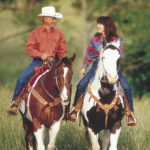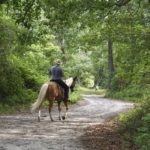Just because winter is here doesn’t mean that you have to say good-bye to riding. In the right conditions and with the right gear, you can enjoy the crisp outdoors and have your own ?dashing through the snow? moment.

I have ridden through fluffy snow, my horse’s hooves and my breath making tracks behind me?a truly exhilarating experience! During much of my time in Quebec this past winter, the conditions were just right for snow riding: the trails were well groomed; the weather was neither too cold nor too warm, meaning that the trails were covered in powdery snow rather than ice; the horses were well conditioned for the weather and had the right gear for the trek; and I kept cozy with a variety of thin wool and fleece layers. A Quebec winter can be long and snowy, but this doesn’t stop Quebec residents from taking to their well-groomed trails to ride.
Whether you’re venturing off for a winter snow riding holiday or taking on the snowy trails close to home, here are tips to prepare for your winter riding, so that you and your horse may discover what it’s like to romp through the snow.
Grooming Guidelines
Before you head out on the trails, groom your horse thoroughly, checking his feet and body just as you would before any ride, but taking extra care during the winter. If you have let your horse’s coat grow, curry well to whisk the dirt away and then brush. If your horse is blanketed and clipped, do the same, but also make sure to check for any irritations from the blanket. Talk to your farrier about your horse’s shoeing needs, as nails, studs, hoof grips or other types of protection and traction may be necessary depending on the terrain and how often you’ll be riding. If your horse has already been out playing in the snow, make sure that his feet are snow- and ice-free before you hit the trails.
Keeping Cozy
Being originally from the south, I probably could never have enough layers on when the weather gets cold! When I ride in colder temperatures, I make sure to wear thin wool and fleece layers (as opposed to cotton, which stays wet when you sweat rather than wicking moisture away). You?ll want to wear layers that button or zip, so that you can unzip your turtleneck when it gets too warm.
You may want to consider insulated boots for winter rides. When selecting your boots, keep in mind that your feet still need to fit into your stirrups; otherwise, you’ll need to purchase bigger stirrups for winter travel. Also, remember to leave a little wiggle room in those boots, as circulation is key.
I wore ski gloves on my hands when I rode in Quebec, but the gloves you choose will depend on how much rein control you need and how active you’ll be on your ride.
To protect your ears, don ear warmers or headbands to wear under your helmet or cowboy hat. My helmet is adjustable, meaning that I can make the inside a bit larger to fit winter headgear or tighten it for summer rides when I don’t need to be any warmer.
Judging the Perfect Snow
Ideally, you want a couple of inches of light, feathery snow on the ground for good snow riding. Avoid riding in icy conditions. Make sure that a sheet of ice is not hiding beneath that snow.
When the trails are covered in snow, you can’t see the terrain. This can be dangerous if you aren?t familiar with the ground where your horse is stepping. Know the footing in the area where you are riding.
Taking on the Snow
Even if you just go out for a walk, be sure you and your horse are well hydrated before you hit the trails. Some people forget about drinking water, as the hot summer sun is not there to remind us, but it is just as important in the winter as it is on warmer rides. Start the ride out slow, taking time for you and your horse to warm up, so you can prevent injuries later on.
Hopefully you’ll be blessed with the perfect snowy conditions, but if not, it never hurts to cut the ride short and head back inside.
After the Ride
Remember to factor in extra time on your winter rides to make sure that your horse is cooled down after the ride. This is very important, as horses take longer to cool down than we do.
End your ride with a nice slow walk and then make sure to dry your horse and use the proper coolers and blankets, depending on his temperature.
Heat up some hot chocolate when you return home. After an energizing but brisk ride in the snow, it will be the best hot chocolate you?ve ever tasted!
Darley Newman is the host of the Emmy Award-winning Public Television series Equitrekking??, which takes viewers on horseback riding vacations around the world. Equitrekking is broadcast on PBS stations, Create TV and on international networks in over 65 countries.
?






